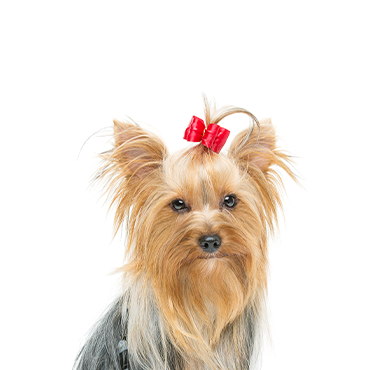
Yorkshire Terrier
Breed History
Also known as the Yorkie, the Yorkshire Terrier originated in England in 1861 under the breed name of the Broken Haired Scotch Terrier. In 1874 the breed’s name was changed to what it is today, Yorkshire Terrier. This breed originally served as a hunter, where it successfully helped eliminate small vermin in fields and farms. The Yorkshire Terrier is a very popular dog breed and is ranked among the most popular toy breeds around the world.
Personality and Temperament
The Yorkshire Terrier is a feisty and lovable dog breed that loves its family. They are playful and have loyal and brave personalities with a very caring and easy-going demeanor. This breed has a long and proven history of making a fine family pet. They do great with children and other pets within the household. They also adjust well to apartment-style or conventional-style housing. There are many reasons why this breed has remained as popular as it has for generations.
Appearance and Grooming
The Yorkshire Terrier generally has a silky, smooth, and glossy coat. They enjoy a thorough daily brushing which will help to enhance the coat’s shine and overall appearance. This breed also does well with a warm bath every two weeks. Routine nail clipping is highly suggested, which will allow your dog to not only look his best but feel his best. Overall, this breed does not require excessive amounts of grooming, but the basics are very important.
Care and Feeding
Yorkshire Terrier puppies do need a lot of energy. As puppies, they are active and constantly growing. From the age of three months to twelve months, they tend to do best with four small meals a day. This will help distribute the energy they need, which will greatly help their mental and physical development. Using high-quality dog food is highly recommended. His meals should also be evenly spaced throughout the day to form a good routine.
Breed Size and Life Expectancy
- The Yorkshire Terrier is a smaller dog that, at full maturity, will stand between seven and nine inches tall.
- They average an adult weight that ranges from four to eight pounds.
- Their average life expectancy is twelve to sixteen years.
Interesting Breed Facts
Fact: The Yorkshire Terrier received its name from where they were developed, Yorkshire, England.
Fact: In the late 1800s, the Yorkshire Terrier was recognized by the American Kennel Club (AKC).
Fact: Yorkies are born tan and black. As they mature, the black will transition to blue.
Petland is honored to offer the highest quality Yorkshire Terrier puppies who will be an instant in your family.
Top Ten Frequently Asked Questions about the Yorkshire Terrier
Can I give My Yorkie Bones?
Dogs love bones and this breed is no different. However, you shouldn’t overdo it especially with bones they can’t easily chew on.
How can I care for Yorkies perfectly?
They are loyal dogs and enjoy the attention you give them. Make sure they get the exercise they need and don’t stuff them with food. For their size, they don’t eat much. Frequently smell their breath and be inquisitive when they bark a lot.
Are Yorkies a good fit for families?
Of course, they are. They love company and have no issues staying indoors. Your kids would love them as they are loving and devoted; t to mention playful.
Do Yorkies shed a lot?
They have a fabulous coat and knot but are remarkably not known to shed a lot although they do have almost the same cycle as other dogs for that. Their shedding hair gets in the mix and you won’t notice until you groom through combing and brushing.
What is Yorkies life expectancy?
The Yorkshire Terrier has a life expectancy of between twelve to sixteen years.
Do Yorkies have common health problems?
They are known to develop issues with their teeth so you should feed them with something dry or a bone to keep them strong. They are also prone to bronchitis, slipped stifle, indigestion and eye infections.
How big do Yorkies grow?
The Yorkshire Terrier can grow to reach heights of six to seven inches and weigh around seven pounds.
Do Yorkshire Terriers cause allergies?
Yes. Even though they mostly have hair, the possibility of you having an allergic reaction to them is not ruled out.
Should Yorkies be spayed?
It’s okay to spray them but you should be well aware of the attendant benefits and problems that come with doing so. For example, urinary incontinence may develop in females but the benefits include eliminating risks of ovarian and mammary cancer.
Is a leash or collar better for Yorkies?
Both could cause terrible injuries however, with the right harness, your Yorkie will be comfortable and safe.


